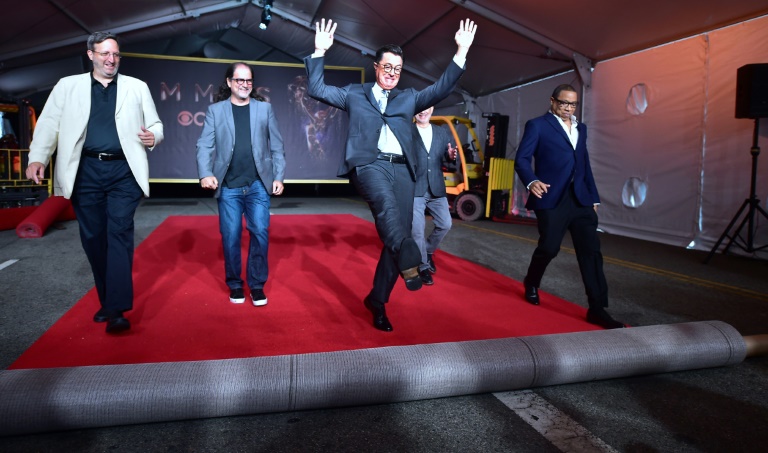With the television landscape more crowded than ever, the clamor to get shows noticed ahead of Sunday's Emmy Awards has been louder and more innovative than ever, according to analysts.

Final ballots were due by August 28, leaving three weeks for the marketing maestros to catch their breath after one of the most intense “for your consideration” campaign seasons yet.
Richard Licata, the CEO of strategic marketing and communications company Licata and Co, and an awards consultant for more than 25 years, says campaigning has become “more frenzied and much more competitive.”
“There are upwards of 500 new original shows, there are more networks than there have ever been,” he told AFP.
“Winning an Emmy, or any kind of major award, is a great branding device and a badge of honor. But it’s getting more difficult to differentiate yourself from the pack.”
Licata, one of 21,000-plus voting members of the Television Academy, was responsible for the first Emmys campaign billboard when he was working at the Showtime network in 2006.
“Now, when I drove down Sunset Boulevard for lunch one day, every billboard was a ‘for your consideration.’ What a difference a decade makes,” he said.
And it isn’t just the advertising that has exploded, according to Licata, who had 54 DVDs from shows vying for attention piled up on his office floor by the end of May.
“It’s a daunting task to be an academy member, feeling a sense of responsibility. I have to watch this programming if I’m going to vote responsibly.”
– Lavish spreads –

Host Stephen Colbert (C) is joined by Television Academy officials for the Red Carpet rollout in Los Angeles, ahead of this weekend’s 69th Emmy Awards
Billboards, television spots and ads on the side of coffee cups are all very well, but shows are finding themselves having to come up with increasingly innovative ways of getting ahead of the crowd.
Perhaps the most eye-catching stunt this year came from Hulu, which sent dozens of women dressed in red cloaks and white bonnets onto the streets of Los Angeles to generate buzz for its hit series “The Handmaid’s Tale.”
Hulu’s internet streaming rival Amazon booked up the Hollywood Athletic Club for two weeks for screenings, panels, serving drinks at its “Goliath” bar and hosting a “Sneaky Pete”-themed gaming room.
Netflix established its own campaign central — a 24,000 square-foot (2,230 square-meter) space it called the “FYSee” — in Beverly Hills, offering voters lavish spreads, free booze and a photo op area where guests could pose on the bikes of the “Stranger Things” kids.
Securing news headlines has always been a shrewd alternative to shelling out a fortune on traditional advertising, and the networks seem to be more canny than ever at turning heads during Emmys campaigning.
Netflix was able to secure wall-to-wall coverage with its announcement in August that it had poached sought-after producer Shonda Rimes from ABC, ending a 15-year relationship that yielded talked-about shows like “Grey’s Anatomy” and “Scandal.”
Generating column inches was also the preferred tactic this year of CBS’s “Mom,” which reportedly donated $250,000 — its entire Emmys marketing budget — to Planned Parenthood.
Elsewhere FX has been capitalising on paranoia over Russian influence in the US with newspaper ads for “The Americans” warning of spies sent by Moscow.
The network also ran a mysterious TV spot with no mention of the show, featuring shots of Washington monuments shrouded in grey and a Soviet flag dangling from the Capitol.
– ‘Not that important’ –
A link — TheRussiansAreHere.org — directed viewers to FX’s Emmy campaign site.
Analysts are divided, however, on how much influence these campaigns have in scooping Emmy nominations, or awards on the night.
Jeetendr Sehdev, a Hollywood branding expert and the bestselling author of “The Kim Kardashian Principle,” believes Emmys campaigning is better at raising long-term awareness of new shows than securing statuettes.
In a litmus test of the influence of the awards, Sehdev has sampled 2,000 adult Americans via online questionnaires and one-on-one interviews since June 2014.
Five in 10 say they are open to considering a lesser known show after seeing a campaign, yet less than 10 percent would likely vote for the show over their recognized favorites if they were academy members.
“This means that even though a marketing campaign might raise awareness of a new show, it’s unlikely that the campaign will actually drive a vote. And it’s the vote that counts,” Sehdev told AFP.
“It also means that if there’s a breakthrough new show that wins it’s because of its organic momentum and fan base — not because of its Emmys marketing campaign.”
Josh Schwartz, who created hit series “Gossip Girl” and “The O.C.,” has been in the business for 20 years and has never come close to an Emmy — but says he couldn’t really care less.
“We only went to the Teen Choice Awards. That’s as far as we’ve got in the accolades. It’s not that important to us. Our whole model is we just want to be someone’s favorite show,” Schwartz told AFP.
Support Local Journalism
Add The Citizen as a Preferred Source on Google and follow us on Google News to see more of our trusted reporting in Google News and Top Stories.






